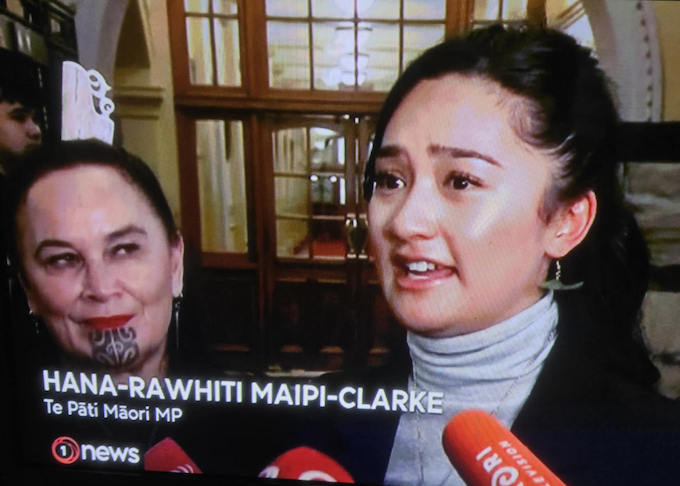
As thousands take to the streets this week to “honour” the country’s 1840 Treaty of Waitangi, the largest daily newspaper New Zealand Herald says the massive event is “redefining activism”.
The Hīkoi mō te Tiriti has been underway since Sunday, with thousands of New Zealanders from all communities and walks of life traversing the more than 2000 km length of the country from Cape Reinga to Bluff and converging on the capital Wellington.
The marches are challenging the coalition government Act Party’s proposed Treaty Principles Bill, introduced last week by co-leader David Seymour.
- READ MORE: Labour’s Willie Jackson ejected from House for calling David Seymour a liar during Treaty Principles Bill reading
- NZ’s Treaty Principles Bill passes first reading after Māori MP evicted over haka
- Senior NZ lawyers call for Treaty Principles Bill to be abandoned
- Hikoi day four – From Huntly towards Rotorua
- Live hīkoi coverage on RNZ news blog
- Other Hīkoi reports
The Bill had its first reading in Parliament today as a young first time opposition Te Pāti Māori MP, Hana-Rawhiti Maipi-Clarke, was suspended for leading a haka and ripping up a copy of the Bill disrupting the vote, and opposition Labour Party’s Māori Development spokesperson Willie Jackson was also “excused” from the chamber for calling Seymour a “liar” against parliamentary rules.
After a second attempt at voting, the three coalition parties won 68-55 with all three opposition parties voting against.
In its editorial today, hours before the debate and vote, The New Zealand Herald said supporters of Toitū te Tiriti, the force behind the Hīkoi, were seeking a community “reconnection” and described their kaupapa as an “activation, not activism; empowerment, not disruption; education, not protest”.
“Many of the supporters on the Hīkoi don’t consider themselves political activists. They are mums and dads, rangatahi, professionals, Pākehā, and Tauiwi (other non-Māori ethnicities),” The Herald said.
‘Loaded, colonial language’
“Mainstream media is often accused of using ‘loaded, colonial language’ in its headlines. Supporters of Toitū te Tiriti, however, see the movement not as a political protest but as a way to reconnect with the country’s shared history and reflect on New Zealand’s obligations under Te Tiriti.
“While some will support the initiative, many Pākehā New Zealanders are responding to it with unequivocal anger; others feel discomfort about suggestions of colonial guilt or inherited privilege stemming from historical injustices.”
The Herald said that politicians like Seymour advocated for a “multicultural” New Zealand, promising equal treatment for all cultures. While this vision sounded appealing, “it glosses over the partnership outlined in Te Tiriti”.
“Seymour argues he is fighting for respect for all, but when multiculturalism is wielded as a political tool, it can obscure indigenous rights and maintain colonial dominance. For many, it’s an unsettling ideology to contemplate,” the newspaper said.
“A truly multicultural society would recognise the unique status of tangata whenua, ensuring Māori have a voice in decision-making as the indigenous people.
“However, policies framed under ‘equal rights’ often silence Māori perspectives and undermine the principles of Te Tiriti.
“Seymour’s proposed Treaty Principles Bill prioritises Crown sovereignty, diminishing the role of hapū (sub-tribes) and excluding Māori from national decision-making. Is this the ‘equality’ we seek, or is it a rebranded form of colonial control?”

Heart of the issue
The heart of the issue, said The Herald, was how “equal” was interpreted in the context of affirmative action.
“Harvard philosopher Michael Sandel argues that true equality acknowledges historical injustices and demands action to correct them. In Aotearoa, addressing the legacy of colonisation is essential,” the paper said.
“Affirmative action is not about giving an unfair advantage; it’s about levelling the playing field so everyone has equal opportunities.
“Some politicians sidestep the real work needed to honour Te Tiriti by pushing for an ‘equal’ and ‘multicultural’ society. This approach disregards Aotearoa’s unique history, where tangata whenua hold a constitutionally recognised status.
“The goal is not to create division but to fulfil a commitment made more than 180 years ago and work towards a partnership based on mutual respect. We all have a role to play in this partnership.
“The Hīkoi mō te Tiriti is more than a march; it’s a movement rooted in education, healing, and building a shared future.
“It challenges us to look beyond superficial equality and embrace a partnership where all voices are heard and the mana (authority) of tangata whenua is upheld.”
The first reading of the bill was advanced in a failed attempt to distract from the impact of the national Hikoi.
RNZ reports that more than 40 King’s Counsel lawyers say the Bill seeks to “rewrite the Treaty itself” and have called on Prime Minister Christopher Luxon and the coalition government to “act responsibly now and abandon” the draft law.














































